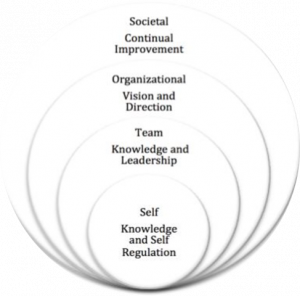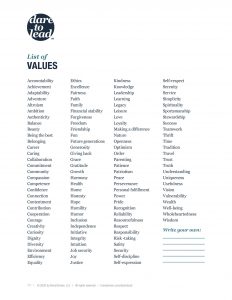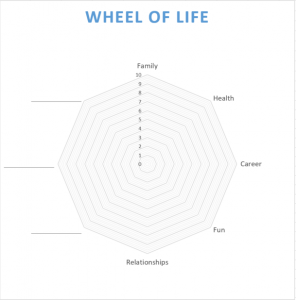1 Workshop 1: Self Awareness and Self Leadership
Grace Ly; John Donald; and Technical Editor: Yasamin Jahani Kia

INTRODUCTION
Why leadership?
LEARNING OBJECTIVES
Engineering is a leadership profession. As the focus of the engineering profession shifts from technology to society, the skills required begin changing as well. Engineers today work in teams and with non-engineers. These leaderships skills will follow you through your educational career and post-graduation. In the photo below we have the leadership domains, which go from self, to team, to organization, and societal. This workshop on Self-Awareness and Self-Leadership is in domain 1. the innermost circle. In this workshop, we will be learning more about ourselves and how to be our own leader.

WHAT ARE CORE BELIEFS?
Core beliefs are the very essence of how we see ourselves, other people, the world around us, and our future. Core beliefs are strongly held and inflexible beliefs that are maintained by the tendency to focus on information that supports the belief and ignoring evidence that contradicts it. These beliefs develop over time, usually from childhood and through significant events or particular circumstances. Although they are firm, as we grow and gain more experiences in life, our core beliefs may change and develop along with us.
Centre for Clinical Interventions. “What are core beliefs?”. Retrieved from What are Core Beliefs?
PERSONALITY IS SHAPED BY CORE BELIEFS
“Personality” is defined as the characteristic patterns of thoughts, feelings, and behaviors that make each person unique. Our personalities are heavily influenced by our core beliefs, which affect our everyday thoughts and actions. Additionally, our personalities also play a large role in our identities, both as people and as leaders. Furthermore, we talk about personalities when we describe ourselves or others in everyday life, referring to different characteristics of an individual’s personality.
Cherry, K (August 12, 2020). “What is Personality?” Very Well Mind. Retrieved from https://www.verywellmind.com/what-is-personality-2795416.
PERSONALITY TESTS
Personality tests are defined as “A tool used to assess human personality”. These tests help you learn more about yourself, showing various qualities that you might possess. They also help you understand potential strengths and weaknesses and help you gain insight on your behavioral patterns.
ENNEAGRAM OF PERSONALITY
One model of human psyche is the Enneagram of personality. The word “Enneagram” comes from the Greek word “ennea” which means nine and “gamma” which means something drawn or written. The Enneagram is a nine-sided figure and is used to analyze a system of personality types. According to the Enneagram, each of the nine personality types is defined by a particular core belief about how the world works. This core belief drives your deepest motivations and fears and fundamentally shapes a person’s worldview and the perspective through which they see the world and the people around them. Understanding our Enneagram type and how it shapes our perceptions can help us to broaden our perspective and approach situations more effectively.
In our education path and as future engineers, many of us turn towards the intellectual approach, using the head. However, each situation may require a different response.
When we make decisions and choices, they are always backed with one part of us taking the lead, such as our emotions, our brains, or our instincts. Depending on our Enneagram, we might tend to gear towards any one of these. This ties into the Enneagram centers.
The nine types of the Enneagram are divided among Heart Types, Head Types, and Body Types.
- Heart Types depend on their emotional intelligence to understand their own reactions and connect with others.
- Head Types depend on their intellectual intelligence to make sense of things and navigate the world around them.
- Body Types depend on their instinctual intelligence to follow their “gut” and respond to threats and opportunities.
Owens, M. “What is the Enneagram of Personality? Truity. Retrieved from https://www.truity.com/enneagram/what-is-enneagram.
ACTIVITY 1: ENNEAGRAM PERSONALITY TEST
For activity 1, please complete the Enneagram Personality Test to identify your dominant personality types and answer reflection questions. The personality test can be accessed using the following link: https://www.truity.com/test/enneagram-personality-test. The worksheet for activity can be found here.
The Nine Types of Enneagrams
- What is your dominant type? (highest percentage)
- What are your second two most dominant types?
The Heart Types
Heart types react with emotions first. They connect with other people on an empathetic level and make sense of the world by understanding their feelings about it. These types are guided by the feelings connected to their emotional relationships with other people. They value things such as emotional support, recognition, and inclusion. Types Two, Three and Four are the heart or feeling centered Enneagram types.
TYPE TWO: THE GIVER
- Want to be liked.
- Find ways that they can be helpful to others so that they can belong.
- Fears being unlovable.
More information can be found here.
TYPE THREE: THE ACHIEVER
- Want to be successful and admired by other people.
- Very conscious of their public image.
- Fear failure and not being seen as valuable by other people.
More information can be found here.
TYPE FOUR: THE INDIVIDUALIST
- Want to be unique and to experience deep, authentic emotions.
- Fear that they are flawed.
- Overly focused on how they are different from other people.
More information can be found here.
The Head Types
Head types react with analysis first. They connect with other people on an intellectual level and make sense of the world by understanding the systems and theories that underlie what they observe. These types are primarily focused on control, which they gain by maintaining stability, security, and competence. Types Five, Six, and Seven are the head-centered Enneagram types.
TYPE FIVE: THE INVESTIGATOR
- Seek understanding and knowledge.
- More comfortable with data than other people.
- Greatest fear is being overwhelmed by their own needs or the needs of other people.
More information can be found here.
TYPE SIX: THE SKEPTIC
- Preoccupied with security and seek safety.
- Like to be prepared for problems.
- Greatest fear is being unprepared and unable to defend themselves from danger.
More information can be found here.
TYPE SEVEN: THE ENTHUSIAST
- Want to have as much fun and adventure as possible.
- Easily bored.
- Fear experiencing emotional pain, especially sadness, and actively seek to avoid it by staying busy.
More information can be found here.
The Body Types
Body types react with an instinctive, gut feeling. They connect with other people based on their physical sense of comfort, and make sense of the world by sensing their body’s reaction to what is happening. The primary drive for this triad is to maintain their independence and limit control from outside influences. They respond by being either overly controlling, overly passive, or overly perfectionistic. Types Eight, Nine, and One are the body or gut centered Enneagram types.
TYPE EIGHT: THE CHALLENGER
- See themselves as strong and powerful.
- Seek to stand up for what they believe in.
- Greatest fear is to be powerless, so they focus on controlling their environment.
More information can be found here.
TYPE NINE: THE PEACEMAKER
- Like to go with the flow and let the people around them set the agenda.
- Fear pushing people away by prioritizing their own needs.
- Tend to be passive.
More information can be found here.
TYPE ONE: THE PERFECTIONIST
- Place a lot of emphasis on following the rules and doing things correctly.
- Fear being imperfect.
- Can be extremely strict with themselves and others.
More information can be found here.
All Enneagrams types above are adapted from https://www.truity.com/enneagram/9-types-enneagram.
REFLECTION
- Does your Enneagram capture you well?
- Do your values line up with what they describe? (Ex. Type 2 strive for love and belonging)
- Do you see actions that might conflict with the core beliefs of your Enneagram?
ACTIVITY 1: KEY TAKEAWAYS
Everyone has different personalities. Even if you had the same dominant type, all your percentages for the nine personalities are different and that is what makes us unique! Some people may not agree with the results of their test, and that is alright. These personality tests do not define who we are, but they do allow us to become more self-aware. Whether you agreed with the test results or not, hopefully you were able to learn more about yourself and your own personality. These traits are good to think about outside of this workshop.
For instance, was there a strength or weakness that you want to work on or be more mindful of?
WHAT ARE PERSONAL VALUES?
Personal values are part of our moral code and they are what we consider important, the things that matter to our well-being and happiness. They also help guides our actions and define who we are.
Why are they important?
Personal values help us make sounder decisions, increase our confidence, and guide us through difficult situations. They can also help us with self-awareness and that has been linked to enhance personal development and improve relationships. In order to succeed and gain fulfillment, we need to understand ourselves and work on applying our values into our everyday lives.
Marinoff, E. (January 12, 2021). “How to Define Your Personal Values and Live by Them for a Fulfilling Life.” Life Hack. Retrieved from https://www.lifehack.org/866227/personal-values
ACTIVITY 2: VALUES
In this activity, you will go through a list of values and refer to the guiding questions below to help you determine your personal values. The worksheet for activity 2 can be found here.
Here is a list of values from the book “Dare to Lead” by Brené Brown:

Questions to help determine your personal values:
- When were you the happiest?
- Identify the times when you were most proud.
- Identify the times where you were the most fulfilled and satisfied.
- Determine your top values, based on your experiences of happiness, pride, and fulfillment.
- Consider a time when you got angry, frustrated, or upset. What was going on? What were you feeling?
REFLECTION
What are three of your personal values?
ACTIVITY 2: KEY TAKEAWAYS
Personal values are what matter most in our lives. Each person has their own unique set of values and this is important because that is what makes each of us different. Each one of us has something new to bring to the table and by keeping our values in mind, we can guide ourselves to become great leaders, focusing on what is important to us.
BALANCED LIVING
Balanced living means considering all aspects of your life such as relationships, work, fitness, health, and emotional well-being. This balance is different for each person, as some may value certain aspects over others. As engineers, this can be difficult due to having a busy schedule but we need to recognize that our values are important. We need to recognize that we are not just an engineers, we are also people.
Why is a balanced living important?
The idea of balanced living helps you guide yourself towards the ideal lifestyle by taking in the different aspects of life and personal values. Evaluating your own lifestyle through the different aspects and values help you understand where your focus lies currently and helps you get to where you want it to be. It also allows you to be the best leader you can be because you know the ‘why’ behind everything that you do.
WHEEL OF LIFE
The Wheel of Life is an activity that helps identify your life balance. It helps ensure that all aspects and needs are fulfilled in the way that YOU need them to be. After evaluating, you can see whether this is where you want your life balance to be and create a plan to guide you towards where you want the focus to be.
ACTIVITY 3: WHEEL OF LIFE
By using the Wheel of Life picture below,
- Rank yourself on the different aspects of life from 1 to 10 based on where you are now (1 = low satisfaction, 10 = high satisfaction).
- Insert your personal values in the spaces as well.
- Feel free to adjust the aspects of life if you feel like an important one was not included (ex. Religion, Finance).
The worksheet for activity 3 can be found here.

Concept adapted from Paul J. Meyer, creator of the Wheel of Life mindtool.
REFLECTION
- Do you like where you are sitting right now? Does it line up with you and your personal values?
- What are some areas where you can improve?
- What changes might you make? Do these changes reflect you and your values?
ACTIVITY 3: KEY TAKEAWAYS
Balanced living is the key to guiding yourself. Each person’s ideal balance will be different based on their own set of values. Our values all differ from each other and how much each aspect of life means to us varies from person to person as well. The goal is to lead yourself to find your life balance. Feel free to print your Wheel of Life and look at it daily to remind yourself of the goals and the guide you made in this activity.
WORKSHOP KEY TAKEAWAYS
Moving forward, it is important to learn how to lead ourselves in order to effectively lead others. Each one of us have different core beliefs and personal values that shape our lives and our values guide us into finding balance in our lives.
RESOURCES
Click here to access the workshop worksheets.

